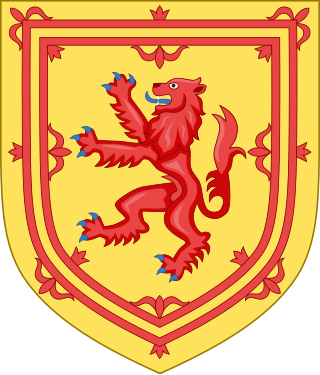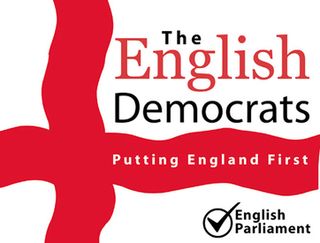Related Research Articles

The politics of Scotland operate within the constitution of the United Kingdom, of which Scotland is a constituent country. Scotland is a democracy, being represented in both the Scottish Parliament and the Parliament of the United Kingdom since the Scotland Act 1998. Most executive power is exercised by the Scottish Government, led by the First Minister of Scotland, the head of government in a multi-party system. The judiciary of Scotland, dealing with Scots law, is independent of the legislature and the executive. Scots law is primarily determined by the Scottish Parliament. The Scottish Government shares some executive powers with the Government of the United Kingdom's Scotland Office, a British government department led by the Secretary of State for Scotland.

The Unionist Party was the main centre-right political party in Scotland between 1912 and 1965.

The English Democrats is a right-wing to far-right, English nationalist political party active in England. A minor party, it currently has no elected representatives at any level of UK government.

Unionism in Scotland is a political movement which favours the continuation of the political union between Scotland and the other countries of the United Kingdom, and hence is opposed to Scottish independence. Scotland is one of four countries of the United Kingdom which has its own devolved government and Scottish Parliament, as well as representation in the UK Parliament. There are many strands of political Unionism in Scotland, some of which have ties to Unionism and Loyalism in Northern Ireland. The two main political parties in the UK — the Conservatives support Scotland remaining part of the UK.

The 2007 UK local government elections were held on 3 May 2007. These elections took place in most of England and all of Scotland. There were no local government elections in Wales though the Welsh Assembly had a general election on the same day. There were no local government elections in Northern Ireland. Just over half of English councils and almost all the Scottish councils began the counts on Friday, rather than Thursday night, because of more complex arrangements regarding postal votes.

The first elections to the new local authorities established by the Local Government Act 1972 in England and Wales and the new Northern Ireland district councils created by the Local Government Act 1972 took place in 1973. Elections to the existing Greater London Council also took place.
This article documents the strengths of political parties in the 333 local authorities of England, 32 local authorities of Scotland, 22 principal councils of Wales and 11 local councils of Northern Ireland.
The Wick Burghs by-election was a Parliamentary by-election held on 8 December 1913. It was a Scottish Highland constituency that returned one Member of Parliament (MP) to the House of Commons of the United Kingdom, elected by the first past the post voting system. The constituency was a district of burghs representing the parliamentary burghs of Cromarty, Dingwall, Dornoch, Kirkwall, Tain and Wick. The by-election took place during the third anniversary of the Liberal Government's re-election of December 1910. It was thought to be a key indicator to the outcome of the following general election anticipated to take place in 1914-15.

The 2013 United Kingdom local elections took place on Thursday 2 May 2013. Elections were held in 35 English councils: all 27 non-metropolitan county councils and eight unitary authorities, and in one Welsh unitary authority. Direct mayoral elections took place in Doncaster and North Tyneside. These elections last took place on the 4 June 2009 at the same time as the 2009 European Parliament Elections, except for County Durham, Northumberland and the Anglesey where elections last took place in 2008.

Helen Miller Fraser, later Moyes, was a Scottish suffragist, feminist, educationalist and Liberal Party politician who later emigrated to Australia.

An Election to the Edinburgh Corporation was held on 3 November 1936, alongside municipal elections across Scotland. The election took place midst an increasingly sectarian political climate, with hardline Protestant and anti-Catholic political parties being on the rise in Glasgow and Edinburgh in the 1930s. The Protestant Action Society (PAS); Edinburgh's far-right Protestant grouping which had inspired a sectarian riot the previous year, won 31% of the vote and got 5 new members elected. The PAS had won 24% in the previous years election.

Elections to the municipal and county councils of England and Wales were held in 1889. Elections to the various county councils were held in January 1889. Progressive candidates won a majority on London County Council, although at this point party labels were relatively unimportant, with municipal and county politics in Victorian Britain being somewhat detached from national politics, and national political divisions. Liberal candidates would do particularly well in Wales however, winning clear majorities in 11 of Wales' 13 counties. The Liberals only failed to take Brecknockshire and Radnorshire, which had hung councils. In the English counties the Liberals took only Cumberland, Holland, London, and the West Riding, with most councils being run on a non-party basis.
The 1894 United Kingdom local elections took place in late 1894. The elections were the first following the Local Government Act 1894, which had created Urban and Rural Districts in England and Wales, and saw the election of members to these various new districts.
The 1892 United Kingdom local elections took place throughout 1892. The elections were the second following the Local Government Act 1888 and Local Government (Scotland) Act 1889, which had established county councils and county borough councils in England, Wales, and Scotland. The election saw elections of members to these various new county councils.

Elections to the Corporation of the City of Glasgow were held on Tuesday 3 November 1896, alongside municipal elections across Scotland, and the wider British local elections.

3,303 candidates stood in the United Kingdom general election of 2017, which was held on 8 June 2017. The deadline for parties and individuals to file candidate nomination papers to the acting returning officer was 16:00 on 11 May 2017.

Local elections in England and Wales were held on 6 May 2021 for more than 145 English local councils for around 5,000 seats, thirteen directly elected mayors in England, and 39 police and crime commissioners in England and Wales. There were also elections to the Scottish Parliament, Senedd and London Assembly, the last in conjunction with the London mayoral election. Also on the same day as these local elections, there was a UK Parliament by-election for the constituency of Hartlepool.
The 1909 United Kingdom local elections took place in 1909 for municipal councils, as well as Rural districts. Municipal elections in Ireland took place in January. Municipal elections across England and Wales, and for Londons Metropolitan Boroughs, were held on Monday 1 November. Scotland held municipal elections the following day.

Local elections in the United Kingdom took place on 5 May 2022. These included elections for all London borough councils, for all local authorities in Wales and Scotland. Most seats in England were last up for election in 2018 and in Scotland and Wales in 2017. The elections coincided with the 2022 Northern Ireland Assembly election. In 91 cases, most of them in Wales, council seats were uncontested, each having only one candidate. Three seats in Scotland remained unfilled as no one nominated to fill them.
References
- ↑ London Evening Standard - Tuesday 03 November 1896 pg.3, "The Municipal Elections"
- 1 2 The Glasgow Herald - Nov 3, 1896, pg6, "The English Municipal Elections: Results of the Polling" (full breakdown)
- ↑ THE EVOLUTION OF THE MUNICIPALITY OF GLASGOW
- ↑ Glasgow: 1830 to 1912, p.471
- ↑ Freeman's Journal - Thursday 26 November 1896 pg.4: "The Municipal Elections"